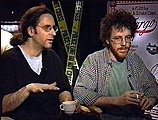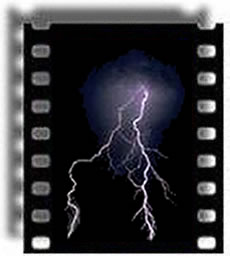
|
|
Joel ∓ Ethan Coen (right to left in pic)
|
|
29 November 1954/21 September 1957
|
|
Minnesota, Mineapolis, USA
|
|
Ethan Coen, screenwriter and director Joel Coen have built a reputation as one of the most visionary and idiosyncratic
filmmakers of the late 20th century. Combining thoughtful eccentricity, wry humor, arch irony, and often brutal violence, the films of the Coen brothers have become synonymous
with a style of filmmaking that pays tribute to classic American movie genres, especially film noir, while sustaining a firmly postmodern feel.
Beginning with Blood Simple, their brutal, stylish 1984 debut, the brothers have amassed a body of work that has established
them as two of the most compelling figures in American and world cinemas. Joel and Ethan forayed into filmmaking in the early 1980s, they began writing screenplays while Joel
acted as an assistant editor for good friend Sam Raimi's Evil Dead (1982). In 1984, the brothers made their screen debut with Blood Simple. Both of them wrote and edited the film
(using the name Roderick Jaynes for the latter duty), for which Joel took directing credit and Ethan took producing credit. It earned considerable critical acclaim and established
the brothers as fresh, original talent.
Their next major effort (after Crimewave, a 1985 film they wrote that was directed by Raimi), the 1987 Raising Arizona, was a
screwball comedy miles removed from the dark, violent content of their previous film, and it won over critics and audiences alike. Their fan base growing, the brothers went on to
make Miller's Crossing (1990), a stark gangster epic with a strong performance from John Turturro, whom the Coens would also use to great effect in their next film, Barton Fink
(1991). Fink earned Joel a Best Director award and a Golden Palm at the 1991 Cannes Film Festival, as well as the Festival's Best Actor award for Turturro. A surreal, nightmarish
film revolving around a writer's creative block, it was a heavily stylized, atmospheric triumph that further established the Coens as visionary arbiters of the bizarre.
Their follow-up to Barton Fink, The Hudsucker Proxy (1994), was a relative critical and commercial disappointment, though it
did boast the sort of heavily stylized, postmodern irony that had so endeared the brothers to their audience. Whatever failings The Hudsucker Proxy exhibited, however, they were
more than atoned for by the unquestionable success of the Coens' next film, Fargo (1996). A black, violent crime comedy with a surprisingly warm heart, it recalled Blood Simple in
its themes of greed, corruption, and murder, but it provided more redemptive sentiment than was afforded to the characters of the previous film. The brothers shared a Best
Original Screenplay Oscar for their work, and another Oscar, for Best Actress, went to Frances McDormand, to whom Joel had been married since 1984.
Following Fargo, the Coens went on to make The Big Lebowski in 1998. A blend of bungled crime and warped comedy, Lebowski was a
laid-back, irreverent revision of the hardboiled L.A. detective genre. It met with mixed critical reception, though it did net a Golden Bear nomination for Joel Coen at the Berlin
Film Festival.
Their films
-
To the White Sea (2002)
-
Man Who Wasn't There, The (2001)
-
O Brother, Where Art Thou? (2000)
-
Big Lebowski, The (1998)
-
Fargo (1996)
-
Hudsucker Proxy, The (1994)
-
Barton Fink (1991)
-
Miller's Crossing (1990)
-
Raising Arizona (1987)
-
Blood Simple (1984)
|




